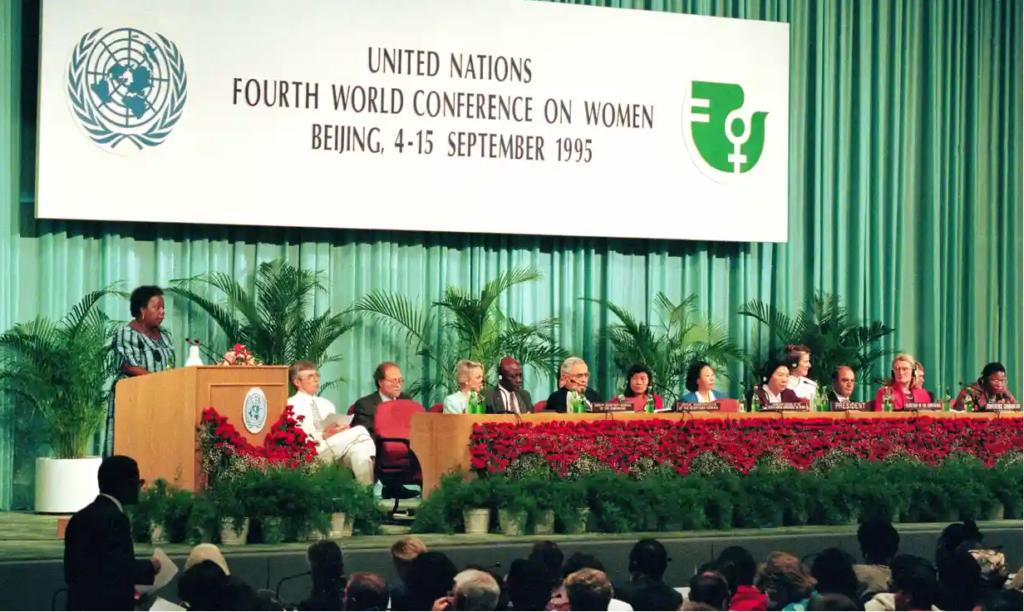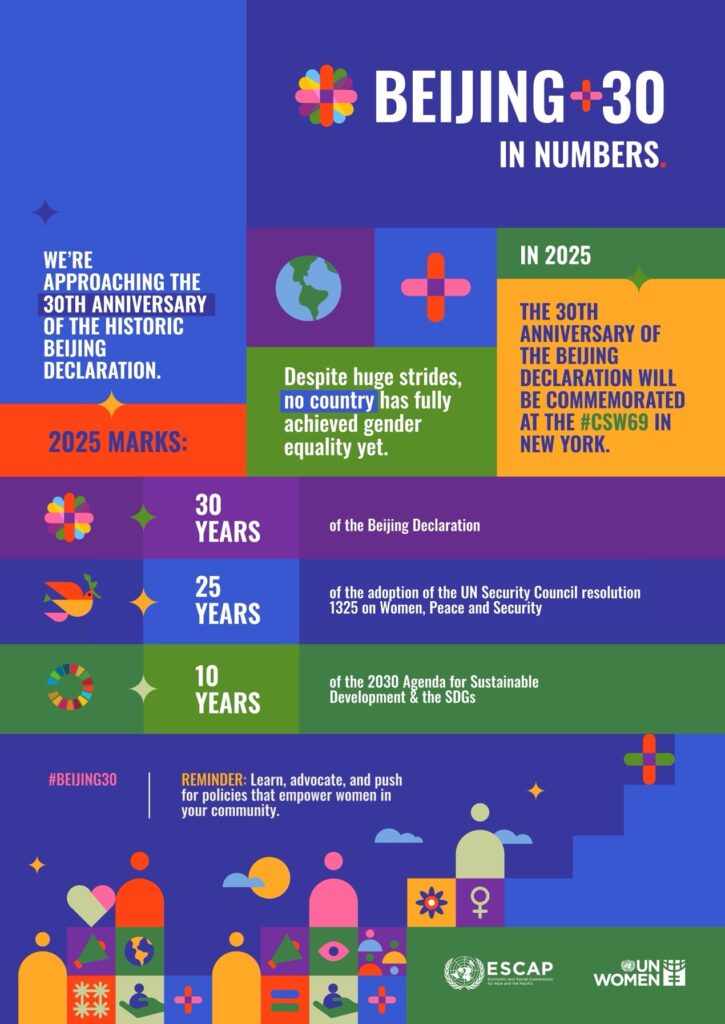In 1995, the Fourth World Conference on Women of the United Nations was successfully held in Beijing. The Beijing Declaration and Platform for Action adopted at the conference has since become a milestone for global gender equality. Standing at the historical juncture of its 30th anniversary, China will hold another global leaders’ meeting on women in Beijing this October. At this pivotal moment of continuity and renewal, China’s release of the white paper “China’s Achievements in Women’s Well-Rounded Development in the New Era” not only showcases the remarkable progress made in advancing women’s causes in China, but also profoundly articulates China’s vision, practices, and accomplishments in promoting gender equality and women’s comprehensive development in the new era. This contribution offers the world a vivid example of “China’s governance.”
Ex-Peruvian congress chief praises progress of Chinese women over 30 years. Chavez recalled leading the Peruvian delegation to the Beijing conference held 30 years ago, which brought unprecedented global attention to women’s rights. At that time, Peru was reorganizing its productive apparatus and consolidating peace after years of internal conflict, while Peruvian women needed support to balance their domestic and professional roles. “The World Conference on Women was also an opportunity to put all these issues on the table,” she said. “We stayed up past midnight debating,” said Chavez. “It was very intense work. We had to examine every phrasing carefully since the Beijing Declaration and Platform for Action were being adopted. It was important to take care of every word.” She said the Peruvian delegation maintained its focus on the core principle: eliminating discrimination and achieving equality between men and women. The final approval of the Beijing Declaration filled her with a profound sense of pride.
Chavez highlighted the progress of Chinese women in government, science and technology, and even space exploration, saying it reflected “the result of structural development in favor of women.” At a time of global change and uncertainty, she voiced support for China’s Global Governance Initiative, calling it “a people-centered approach” that reminds the world “the international system must serve humanity.”
Chavez emphasized that women and children remain the most vulnerable to poverty and discrimination, and called for policies to prevent the exploitation of women. With decades of advocacy for gender equality, including in education, Chavez praised China’s efforts to promote equity through smart campuses and digital learning. During her visit to China in 2023, Chavez witnessed firsthand educational achievements at all levels, noting “the clear purpose of ensuring that economic progress benefits the entire population.” Looking ahead to the upcoming Global Leaders’ Meeting on Women in Beijing, which marks the 30th anniversary of the 1995 conference, Chavez expressed confidence in its success.

In the new era, the Communist Party of China and the Chinese government it leads have elevated their commitment to women’s advancement to unprecedented heights, consistently integrating national development with the progress of gender equality. China’s practice of advancing women’s comprehensive development is rooted in a solid foundation of policies and the rule of law. The fundamental state policy of upholding gender equality has been enshrined in the CPC’s governing program. The 18th, 19th, and 20th CPC National Congresses all emphasized “adhering to the fundamental state policy of gender equality and safeguarding the lawful rights and interests of women and children.” President Xi Jinping personally planned, deployed, and promoted this work. Party committees and governments at all levels conduct annual thematic studies on women’s work, providing strong political guarantees for the advancement of women’s causes. China enacted its first Civil Code incorporating a section on marriage and family, as well as the Law Against Domestic Violence. It revised the Law on the Protection of Women’s Rights and Interests and amended the Criminal Law and the Rural Land Contract Law, among others. Gender equality assessment mechanisms for laws and policies have been established at the national level and in all 31 provinces, autonomous regions, and municipalities. Women’s federations at all levels have carried out legal awareness campaigns, with legal services reaching over 400 million women.
In the new era, women’s pivotal role as one-half of society has achieved breakthroughs across all sectors. In political participation, women reached historic highs as members of the 14th National People’s Congress (26.5%), the National Committee of the Chinese People’s Political Consultative Conference (22.4%), and delegates to the 20th CPC National Congress (27%). Regarding high-quality development, women account for approximately 43% of the workforce and 45.8% of scientific and technological professionals. Women constitute about one-third of workers in new sectors like digital trade, e-commerce, and live-streaming, with the digital economy continuously unlocking gender dividends. Women have also made outstanding contributions in cutting-edge fields such as manned spaceflight, domestically produced large aircraft, biomedicine, deep-sea exploration, and artificial intelligence. In cultural prosperity, female cultural workers have produced an abundance of high-quality works, with women accounting for 25% of the 3,997 national-level inheritors of intangible cultural heritage.
In the new era, China has integrated into the global governance of women’s affairs with unprecedented depth. Guided by the vision of building a community with a shared future for mankind, China has transformed the Global Development Initiative, Global Security Initiative, Global Civilization Initiative, and Global Governance Initiative proposed by President Xi Jinping into concrete actions that promote the comprehensive development of women. Together with the United Nations, we have co-hosted the Global Summit on Women and established the Education Award for Girls and Women. Within cooperation frameworks such as APEC and the G20, we have created platforms to empower women, leading efforts to advance multilateral and regional women’s development agendas. We have expanded our “circle of friends” in women’s cooperation, maintaining friendly exchanges with women’s organizations and institutions in over 140 countries. We have implemented projects worth more than $40 million in the women’s sector in over 20 countries, and our mushroom grass technology has helped women in 106 countries find employment. In the face of global challenges, we have dispatched more than 1,200 female officers and soldiers to participate in UN peacekeeping operations, providing humanitarian assistance to women and children affected by conflict and disasters, demonstrating the responsibility of a major country.
As the Global South rises, the unleashed potential of women will be an indispensable force for building a more equal, inclusive, and prosperous world for all. The Forum on China-Africa Cooperation Beijing Action Plan (2025–2027), released during the Beijing Summit of the Forum on China-Africa Cooperation(FOCAC) last September, explicitly incorporates multiple initiatives. These include supporting women’s dialogue, enhancing capacity building for African women, and promoting women’s comprehensive development. This plan charts the course for deepening cooperation between China and Africa in women’s affairs, vividly illustrating China’s commitment to translating its pledge to advance global women’s causes into concrete actions.
From initiative to practice, the path of women’s development that bridges Chinese wisdom with global action grows ever broader. The upcoming Global Leaders’ Meeting on Women offers a new opportunity to advance this journey. Let us pool our wisdom and unite our strength, jointly tackle new challenges in the digital age, explore fresh pathways for women’s empowerment, and write a new chapter in the advancement of women’s causes.


